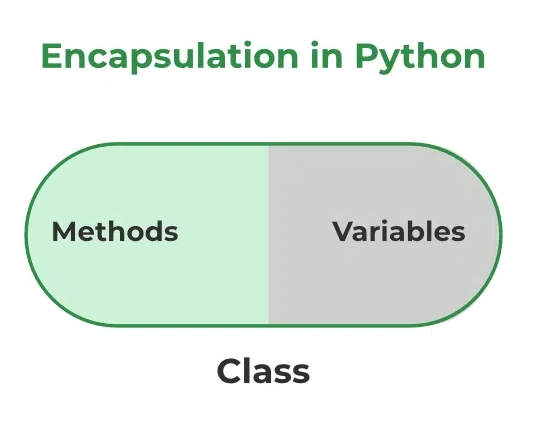Encapsulation
Class Creation Considerations:

-
- Encapsulation: the bundling of Variables and Methods in a Class to ensures that the behavior of an object can only be affected through its Public API. It lets us control how much a change to one object will impact other parts of the system by ensuring that there are no unexpected dependencies between unrelated components.
- Attributes: Variables are assigned attributes within a __init__ function
- Public API: Methods are functions that manipulate the Attributes, such as get/set
- Information Hiding: Restricting access to implementation details and violating state invariance
- Protected Variable:
- Members of the class that cannot be accessed outside the class but can be accessed from within the class and its subclasses
- In Python, Using underscore (_name) to denote Protected
- Private Variable:
- Members can neither be accessed outside the class nor by any base class
- In Python, double underscore (__name) to denote Private.
- Note that Python is not a true Protected or Private enforced by the language like C++
- Can still access protected and private variables via dot notation ( hello._name)
from dataclasses import dataclass
from enum import Enum
from typing import Any
class PaymentStatus(Enum):
CANCELLED = "cancelled"
PENDING = "pending"
PAID = "paid"
class PaymentStatusError(Exception):
pass
@dataclass
class OrderNoEncapsulationNoInformationHiding:
"""Anyone can get the payment status directly via the instance variable.
There are no boundaries whatsoever."""
payment_status: PaymentStatus = PaymentStatus.PENDING
@dataclass
class OrderEncapsulationNoInformationHiding:
"""There's an interface now that you should use that provides encapsulation.
Users of this class still need to know that the status is represented by an enum type."""
_payment_status: PaymentStatus = PaymentStatus.PENDING
def get_payment_status(self) -> PaymentStatus:
return self._payment_status
def set_payment_status(self, status: PaymentStatus) -> None:
if self._payment_status == PaymentStatus.PAID:
raise PaymentStatusError(
"You can't change the status of an already paid order."
)
self._payment_status = status
@dataclass
class OrderEncapsulationAndInformationHiding:
"""The status variable is set to 'private'. The only thing you're supposed to use is the is_paid
method, you need no knowledge of how status is represented (that information is 'hidden')."""
_payment_status: PaymentStatus = PaymentStatus.PENDING
def is_paid(self) -> bool:
return self._payment_status == PaymentStatus.PAID
def is_cancelled(self) -> bool:
return self._payment_status == PaymentStatus.CANCELLED
def cancel(self) -> None:
if self._payment_status == PaymentStatus.PAID:
raise PaymentStatusError("You can't cancel an already paid order.")
self._payment_status = PaymentStatus.CANCELLED
def pay(self) -> None:
if self._payment_status == PaymentStatus.PAID:
raise PaymentStatusError("Order is already paid.")
self._payment_status = PaymentStatus.PAID
@dataclass
class OrderInformationHidingWithoutEncapsulation:
"""The status variable is public again (so there's no boundary),
but we don't know what the type is - that information is hidden. I know, it's a bit
of a contrived example - you wouldn't ever do this. But at least it shows that
it's possible."""
payment_status: Any = None
def is_paid(self) -> bool:
return self.payment_status == PaymentStatus.PAID
def is_cancelled(self) -> bool:
return self.payment_status == PaymentStatus.CANCELLED
def cancel(self) -> None:
if self.payment_status == PaymentStatus.PAID:
raise PaymentStatusError("You can't cancel an already paid order.")
self.payment_status = PaymentStatus.CANCELLED
def pay(self) -> None:
if self.payment_status == PaymentStatus.PAID:
raise PaymentStatusError("Order is already paid.")
self.payment_status = PaymentStatus.PAID
def main() -> None:
test = OrderInformationHidingWithoutEncapsulation()
test.pay()
print("Is paid: ", test.is_paid())
if __name__ == "__main__":
main()


No Comments